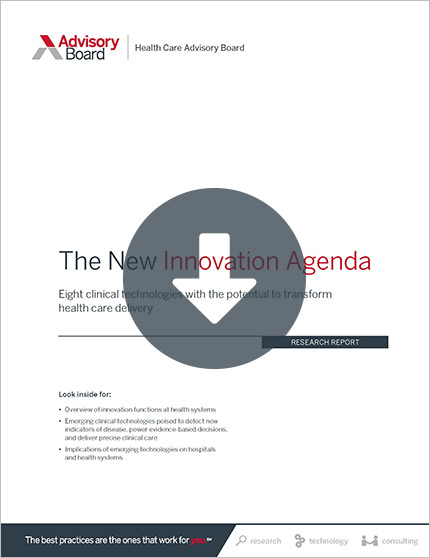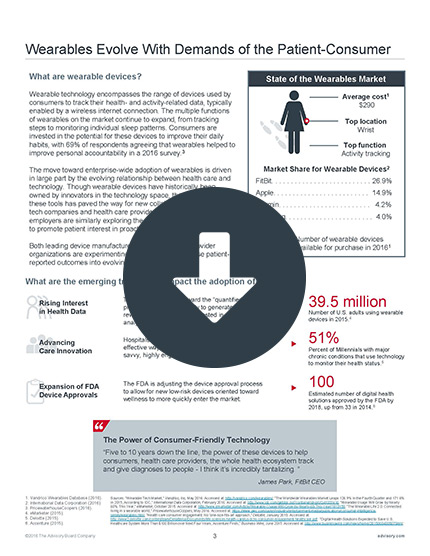Auto logout in seconds.
Continue LogoutEach year, MIT Technology Review publishes a list of the year's "10 Breakthrough Technologies"—and 2019's list, curated by Bill Gates, includes seven innovations poised to reshape health care in America and around the globe.
The technologies Gates expects to change the world
In narrowing down the list, Gates writes, "I wanted to choose things that not only will create headlines in 2019 but captured this moment in technological history."
He adds, "My selections include amazing new tools that will one day save lives, from simple blood tests that predict premature birth to toilets that destroy deadly pathogens. I'm equally excited by how other technologies on the list will improve our lives."
Here are the seven unranked innovations in health care that Gates believes could change the world for the better.
1. Predicting preemies
Being born prematurely is the leading cause of death for children under five years old—but within five years, doctors might offer a new blood test that can predict whether a pregnant woman is at risk of a premature birth, according to the MIT Technology Review. The test, which was created by Stanford University bioengineer Stephen Quake, detects and sequences free-floating RNA in the mother's blood that can help scientists detect fluctuations in seven genes that are connected to premature birth. Once the genes are identified, doctors can attempt to prevent the premature birth and increase the baby's chance of survival. Quake said the blood tests are fast and cost less than $10 each.
2. Swallowable gut probe
Screening for gut diseases such as environmental enteric dysfunction (EED) can be difficult, especially in children and infants, who must be anesthetized before undergoing an endoscopy. But researchers at Massachusetts General Hospital (MGH) are currently testing a tiny, swallowable device that can capture images of the gut and screen for gut diseases without anesthesia, according to the MIT Technology Review. The device, developed by Guillermo Tearney, a pathologist and engineer at MGH, comes with a tether that clinicians can use to capture specific points of interest within the digestive tract and to remove it when finished. The device is currently being used in adult patients at MGH to screen for Barrett's esophagus, and Tearney is preparing to test a smaller version of the capsule for infants.
3. Cancer vaccines
Researchers are currently testing a custom cancer vaccine that uses a patient's immune system to identify and attack unique DNA mutations in cancer cells. Unlike other treatments such as chemotherapy, the vaccine only targets cancer cells, which the MIT Technology Review reports could help reduce or prevent damage to healthy cells. A German startup called BioNTech, in collaboration with biotech company Genentech, began testing the vaccine in cancer patients in 2017. The trial will target more than 10 solid tumor cancers in more than 560 patients around the world.
4. Carbon dioxide catcher
Researchers predict climate change will cause an increase in disease outbreaks, heat-related deaths, and other negative health outcomes. In order to prevent these and other dangerous effects, the UN's climate channel estimated the world would have to remove 1 trillion tons of carbon dioxide emissions from the atmosphere. In five to ten years, according to the MIT Technology Review, researchers might release a tool that could do the job. David Keith, a climate scientist at Harvard University, said the tool leverages a technique called direct air capture and can remove greenhouse gases from the atmosphere for less than $100 per ton. Scientists hope to embed the captured carbon in concrete or polymers, or bury it underground where it cannot be released back into the atmosphere.
5. A wearable ECG
While some fitness trackers and wearables come with heart rate tracking capabilities, the measurements are not as precise as those recorded by medical devices, according to the MIT Technology Review. But increasingly, companies are inserting ECGs into wearable devices such as Apple's Series 4 Apple Watch, and experts predict these gadgets could one day match the precision of in-office tests.
6. Sanitation without sewers:
About 2.3 billion people around the world lack good sanitation and die from bacteria, viruses, and parasites that are spread through fecal matter released into streams and ponds. In 2011, Gates launched the Reinvent the Toilet Challenge, and researchers responded by developing numerous energy-efficient toilets that can dispose and treat waste locally without a sewer system. The one drawback is that some of the prototypes are designed to be used by a specific number of users each day—in one case, by tens of thousands of users, and in another case, by only a handful. Now, scientists are aiming to mass-produce units that are less expensive and can be used in communities of all sizes.
7. AI assistants
Health care systems are employing AI assistants such as Amazon's Alexa and Apple's Siri to offer post-surgery care and check blood pressure, according to the MIT Technology Review. While voice assistants still lack the ability to understand the more complex elements of natural language, recent developments might help AIs graduate from understanding basic commands to being able to hold conversations. For instance, researchers from OpenAI last year started training its systems to understand unlabeled text to avoid having to tag the data manually. Similarly, Google last year developed an AI system called BERT that studies millions of sentences in order to identify the missing words in a sentence. These advancements might allow hospitals to incorporate voice assistants into some aspects of patient care delivery (Gates et al., MIT Technology Review, 2/27; Gates, MIT Technology Review, 2/27).
Learn more
Check out our resources on four of the seven innovations Gates believes could change the world for the better:
- Perinatal care | Report: 9 elements of top perinatal patient safety programs
- Cancer vaccines | Study: Learn the latest clinical innovations in oncology
- Wearables | Cheat sheet: What you need to know about wearables
- Artificial Intelligence (AI) | Cheat sheet: What you need to know about AI
Don't miss out on the latest Advisory Board insights
Create your free account to access 1 resource, including the latest research and webinars.
Want access without creating an account?
You have 1 free members-only resource remaining this month.
1 free members-only resources remaining
1 free members-only resources remaining
You've reached your limit of free insights
Become a member to access all of Advisory Board's resources, events, and experts
Never miss out on the latest innovative health care content tailored to you.
Benefits include:
You've reached your limit of free insights
Become a member to access all of Advisory Board's resources, events, and experts
Never miss out on the latest innovative health care content tailored to you.
Benefits include:
This content is available through your Curated Research partnership with Advisory Board. Click on ‘view this resource’ to read the full piece
Email ask@advisory.com to learn more
Click on ‘Become a Member’ to learn about the benefits of a Full-Access partnership with Advisory Board
Never miss out on the latest innovative health care content tailored to you.
Benefits Include:
This is for members only. Learn more.
Click on ‘Become a Member’ to learn about the benefits of a Full-Access partnership with Advisory Board
Never miss out on the latest innovative health care content tailored to you.


